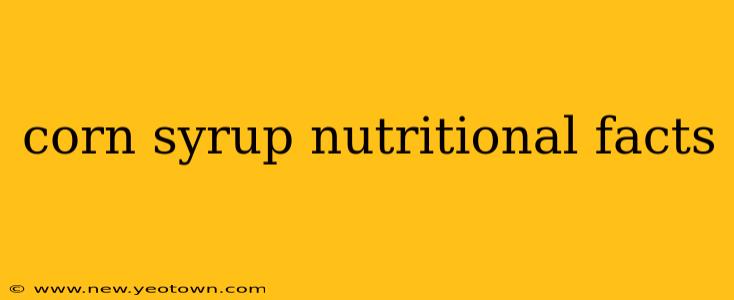Corn syrup. The name conjures images of sugary treats and sweet tea, but what exactly is it, and what are the nutritional facts we should know? Let's unravel the mysteries surrounding this common sweetener, revealing its composition, health implications, and addressing some frequently asked questions.
Our journey begins not in a laboratory, but in a cornfield. Corn syrup's story starts with corn, specifically the kernels. Through a process of enzymatic hydrolysis, the starch within the corn is broken down into simpler sugars, primarily glucose and fructose. This process results in a thick, viscous liquid that's incredibly versatile in the food industry.
But what exactly is in this sweet liquid? That's where the nutritional facts come in. A typical serving (about 1 tablespoon, or 15 grams) of high-fructose corn syrup (HFCS), the most prevalent type, contains roughly 45 calories. Almost all of these calories are from carbohydrates, with little to no protein or fat. The exact breakdown of glucose and fructose can vary depending on the type of HFCS. HFCS 55, for example, has approximately 55% fructose and 45% glucose.
What are the differences between corn syrup and high-fructose corn syrup?
This is a crucial distinction. While both start with corn starch, the processing differs significantly. Corn syrup is predominantly glucose, while high-fructose corn syrup (HFCS) has undergone further processing to increase its fructose content. This higher fructose content impacts how our bodies metabolize it, influencing factors like insulin response and potential health effects.
Is corn syrup bad for you?
This is a question without a simple yes or no answer. The impact of corn syrup on health is complex and depends on various factors, including overall diet, individual metabolism, and quantity consumed. Excessive consumption of any added sugar, including corn syrup and HFCS, is linked to weight gain, increased risk of type 2 diabetes, and other health problems. However, moderate consumption as part of a balanced diet is generally not considered detrimental.
How much sugar is in corn syrup?
The sugar content is virtually 100% of the calories in corn syrup. As a simple sugar, it's rapidly digested and absorbed by the body, leading to a quick spike in blood sugar levels.
What foods contain corn syrup?
Corn syrup and HFCS are incredibly common in processed foods. Think soda, candy, baked goods, breakfast cereals, and many condiments. Checking food labels is crucial to understanding the sugar content and identifying hidden sources of corn syrup in your diet.
What are the health risks associated with corn syrup consumption?
As mentioned, excessive consumption can contribute to several health issues. These include weight gain, increased risk of type 2 diabetes, metabolic syndrome, and potentially even non-alcoholic fatty liver disease (NAFLD). It's essential to remember that this isn't necessarily due solely to corn syrup but rather its contribution to overall added sugar intake.
Are there any health benefits of corn syrup?
Truthfully, there are minimal to no health benefits associated with corn syrup. It primarily serves as a sweetener, providing energy but lacking essential vitamins, minerals, or other nutritional value. Opting for healthier alternatives, such as fruits or honey in moderation, offers both sweetness and added nutrients.
In conclusion, the nutritional facts of corn syrup are straightforward: it's primarily sugar. Understanding its composition and widespread presence in processed foods is key to making informed dietary choices. Moderate consumption as part of a balanced diet is generally acceptable, but focusing on whole foods and limiting added sugars, including corn syrup, remains vital for overall health and well-being. Remember, a balanced diet and an active lifestyle are paramount to maintaining optimal health.

